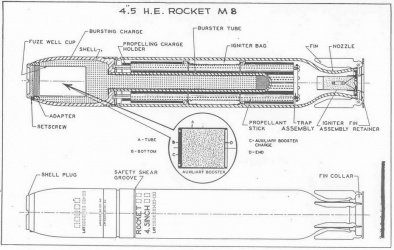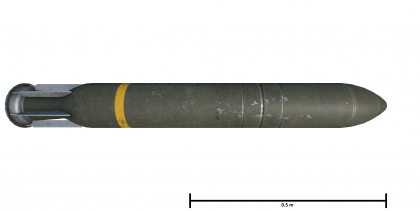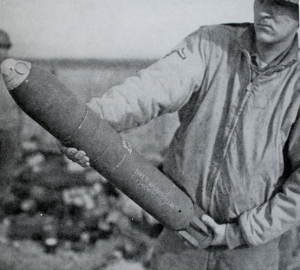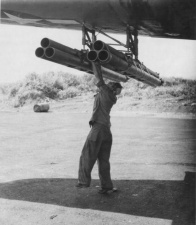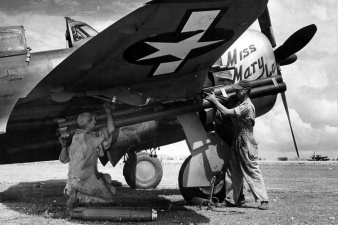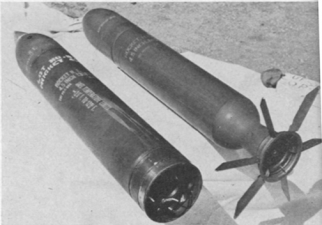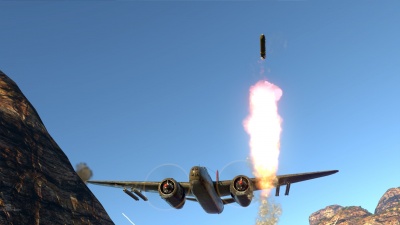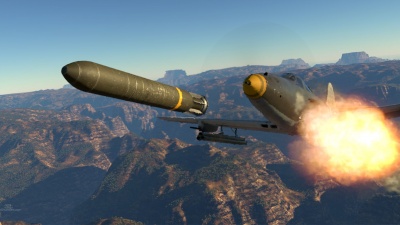Difference between revisions of "M8"
Colok76286 (talk | contribs) (Edits) |
m (→Usage in battles: Higgins uses the Mk.7) |
||
| Line 59: | Line 59: | ||
== Usage in battles == | == Usage in battles == | ||
<!-- ''Describe situations when you would utilise this rocket in-game (vehicle, pillbox, base, etc)'' --> | <!-- ''Describe situations when you would utilise this rocket in-game (vehicle, pillbox, base, etc)'' --> | ||
| − | The M8 rockets are typically mounted on an aircraft in groups of three (usually two launchers of three) | + | The M8 rockets are typically mounted on an aircraft in groups of three (usually two launchers of three). The M8 rocket is typically best utilised against personnel, installations and light armoured vehicles due to the fantastic fragmentation of this rocket upon impact and explosion. |
=== Pros and cons === | === Pros and cons === | ||
Revision as of 11:22, 16 October 2022
| This page is about the American-made rocket M8. For other uses, see M8 (Disambiguation). |
Contents
Description
The 4.5-inch (114 mm) M8 fin-stabilised rocket is approximately 33 in (0.83 m) in length and 40 lb (18.1 kg) and is almost an equivalent of a 105 mm Shell M1. This rocket utilises an M4 fuse which explodes after a 0.015-sec delay set off by auxiliary M1 booster.
The components of the rocket break down into three separate sections, the fuse, shell and motor body. The shell of the rocket or the head is made up of a warhead body fitted with a burster tube. The burster tube itself extends from the shell through the rocket body and through the rocket motor, the purpose of this is to expand the explosive capability of the rocket by utilising the rocket motor as an additional source of fragmentation in the explosion. Once fired, folding fins around the tail flange will extend and spin-stabilise the rocket.
The M8 rocket requires a tube launcher to launch (as opposed to being installed directly to external hardpoints) and this is accomplished by mounting an M10 cluster launcher to the underside of the aircraft's wings or fuselage belly. The M10 is a cluster of three 10-foot tubes manufactured from plastic (M14s are made from steel and M15s are constructed of magnesium alloy) and are banded together in six places and are secured to the aircraft via two mounting straps, front and rear. The rear strap also bears the electrical connections which link up to the rockets once in the tubes as the firing links. The release and contact mechanisms are protected from flying links and fired casings ejected from the wing guns to prevent accidental damage or drop release of the M10 launcher.
Vehicles equipped with this weapon
| Vehicles equipped with this weapon | |
|---|---|
| Fighters | |
| P-39 | P-39N-0 · P-39Q-5 |
| P-47 | P-47D-22-RE · ▄Thunderbolt Mk.1 · P-47D-28 |
| P-51D | P-51D-5 · P-51D-10 · ␗P-51D-20 · P-51D-20-NA · P-51D-30 · P-51H-5-NA · ␗P-51K |
| Twin-engine fighters | P-38G-1 · XP-38G · P-38J-15 · Bong's P-38J-15 |
| Strike aircraft | A-20G-25 |
| Medium tanks | Calliope · M26 T99 |
General info
| Rocket characteristics | |
|---|---|
| Mass | 17 kg |
| Maximum speed | 260 m/s |
| Explosive mass | 1.95 kg TNTeq |
| Warhead type | HE |
Effective damage
After slamming into a target a slight delay will set off the explosive mass of the missile, causing the TNT shell to detonate along with fragmenting the rocket body and motor. Damage is caused by both the high explosive and fragmentation.
Comparison with analogues
Give a comparative description of rockets that have firepower equal to this weapon.
Usage in battles
The M8 rockets are typically mounted on an aircraft in groups of three (usually two launchers of three). The M8 rocket is typically best utilised against personnel, installations and light armoured vehicles due to the fantastic fragmentation of this rocket upon impact and explosion.
Pros and cons
Pros:
- Lightweight, able to mount on fighter aircraft
- Can be used against bombers
Cons:
- Inaccurate, best fired in groups to increase the chance of hitting a target
- Increases aerodynamic drag, decreasing flight efficiency
History
Describe the history of the creation and combat usage of the weapon in more detail than in the introduction. If the historical reference turns out to be too long, take it to a separate article, taking a link to the article about the weapon and adding a block "/History" (example: https://wiki.warthunder.com/(Weapon-name)/History) and add a link to it here using the main template. Be sure to reference text and sources by using <ref></ref>, as well as adding them at the end of the article with <references />.
Media
- Images
Image of ground crew member adjusting M8 rocket launch tubes under the wing of an A-20G-25.
Crew members loading M8 rocket tubes under the wing of an P-47D in Saipan, 1944.
An A-20G-25 firing off an M8 rocket from an M10 Bazooka tube launcher.
A P-39Q-5 firing off an M8 rocket from an underwing M10 Bazooka tube launcher.
See also
Links to the articles on the War Thunder Wiki that you think will be useful for the reader, for example:
- reference to the article about the variant of the weapon;
- references to approximate analogues by other nations and research trees.
External links
- US Rockets and Fuzes - United States Navy Bomb Disposal Manual, 15 May 1945, pg. 14
- Hedekin, Thomas B., The Field Artillery Journal, October 1946, Volume 36, No. 10, page 568
- OS-9-69 Rockets and Launchers, All Types, The Ordnance School - Aberdeen Proving Ground, Maryland, February 1944, pages 65, 67 and 68.
- War Thunder Forum Bug Report: M8 Rocket Performance Error
- Wikipedia - M8 (rocket)
| Naval special armaments | |
|---|---|
| USA | |
| Mortars | 7.2-inch T37 · Mk 2 |
| Rockets | 5-inch GPSR Mk.7 · Mark 108 Weapon alfa |
| Missiles | RIM-24A |
| Germany | |
| Rockets | M/50 Bofors |
| Missiles | Strela-2M |
| USSR | |
| Mortars | BM-37 · RBM · RBU-1200 · RBU-2500 · RBU-6000 · RKU-36U |
| Rockets | BM-14-17 · BM-21 · M13 · M-8 |
| Missiles | Volna-M |
| Britain | |
| Mortars | Ordnance ML 4.2-inch mortar |
| Japan | |
| Rockets | 4.5-inch BBR Mk.7 (USA) · Mark 108 Weapon alfa (USA) |
| Italy | |
| Missiles | Nettuno |
| France | |
| Missiles | SS.11 |


